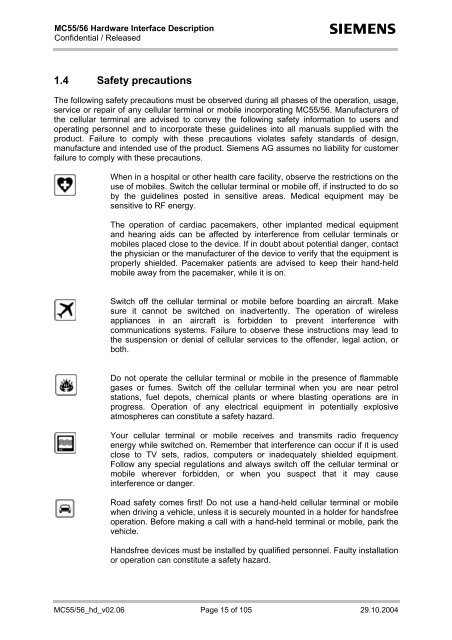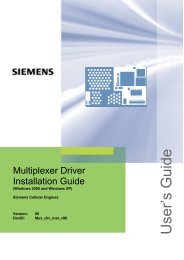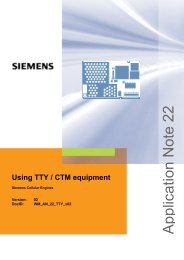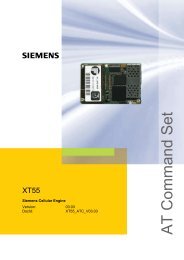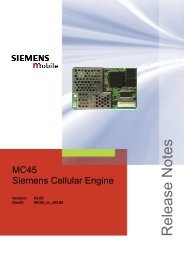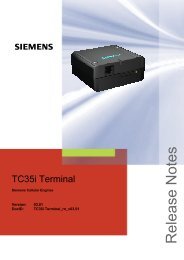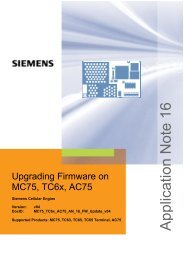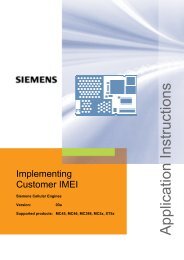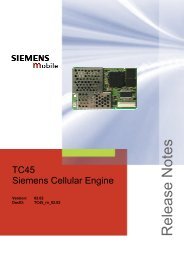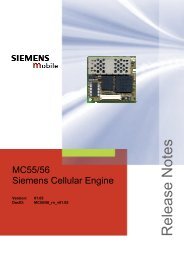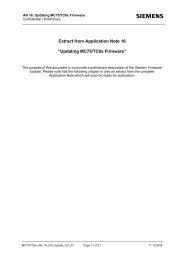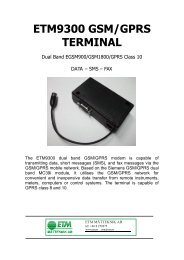Hardware Interface Description - Wireless Data Modules
Hardware Interface Description - Wireless Data Modules
Hardware Interface Description - Wireless Data Modules
You also want an ePaper? Increase the reach of your titles
YUMPU automatically turns print PDFs into web optimized ePapers that Google loves.
MC55/56 <strong>Hardware</strong> <strong>Interface</strong> <strong>Description</strong><br />
Confidential / Released<br />
s<br />
1.4 Safety precautions<br />
The following safety precautions must be observed during all phases of the operation, usage,<br />
service or repair of any cellular terminal or mobile incorporating MC55/56. Manufacturers of<br />
the cellular terminal are advised to convey the following safety information to users and<br />
operating personnel and to incorporate these guidelines into all manuals supplied with the<br />
product. Failure to comply with these precautions violates safety standards of design,<br />
manufacture and intended use of the product. Siemens AG assumes no liability for customer<br />
failure to comply with these precautions.<br />
When in a hospital or other health care facility, observe the restrictions on the<br />
use of mobiles. Switch the cellular terminal or mobile off, if instructed to do so<br />
by the guidelines posted in sensitive areas. Medical equipment may be<br />
sensitive to RF energy.<br />
The operation of cardiac pacemakers, other implanted medical equipment<br />
and hearing aids can be affected by interference from cellular terminals or<br />
mobiles placed close to the device. If in doubt about potential danger, contact<br />
the physician or the manufacturer of the device to verify that the equipment is<br />
properly shielded. Pacemaker patients are advised to keep their hand-held<br />
mobile away from the pacemaker, while it is on.<br />
Switch off the cellular terminal or mobile before boarding an aircraft. Make<br />
sure it cannot be switched on inadvertently. The operation of wireless<br />
appliances in an aircraft is forbidden to prevent interference with<br />
communications systems. Failure to observe these instructions may lead to<br />
the suspension or denial of cellular services to the offender, legal action, or<br />
both.<br />
Do not operate the cellular terminal or mobile in the presence of flammable<br />
gases or fumes. Switch off the cellular terminal when you are near petrol<br />
stations, fuel depots, chemical plants or where blasting operations are in<br />
progress. Operation of any electrical equipment in potentially explosive<br />
atmospheres can constitute a safety hazard.<br />
Your cellular terminal or mobile receives and transmits radio frequency<br />
energy while switched on. Remember that interference can occur if it is used<br />
close to TV sets, radios, computers or inadequately shielded equipment.<br />
Follow any special regulations and always switch off the cellular terminal or<br />
mobile wherever forbidden, or when you suspect that it may cause<br />
interference or danger.<br />
Road safety comes first! Do not use a hand-held cellular terminal or mobile<br />
when driving a vehicle, unless it is securely mounted in a holder for handsfree<br />
operation. Before making a call with a hand-held terminal or mobile, park the<br />
vehicle.<br />
Handsfree devices must be installed by qualified personnel. Faulty installation<br />
or operation can constitute a safety hazard.<br />
MC55/56_hd_v02.06 Page 15 of 105 29.10.2004


